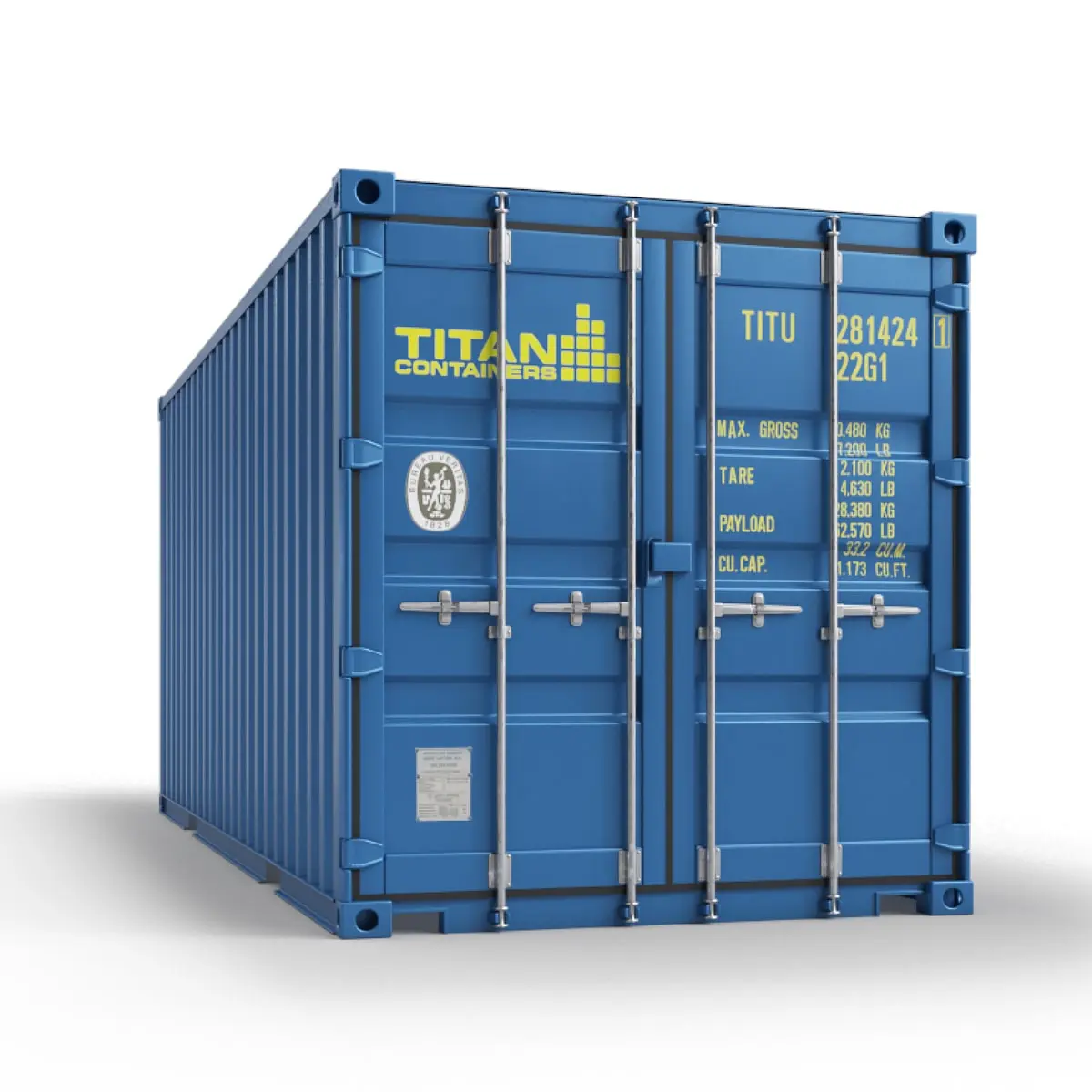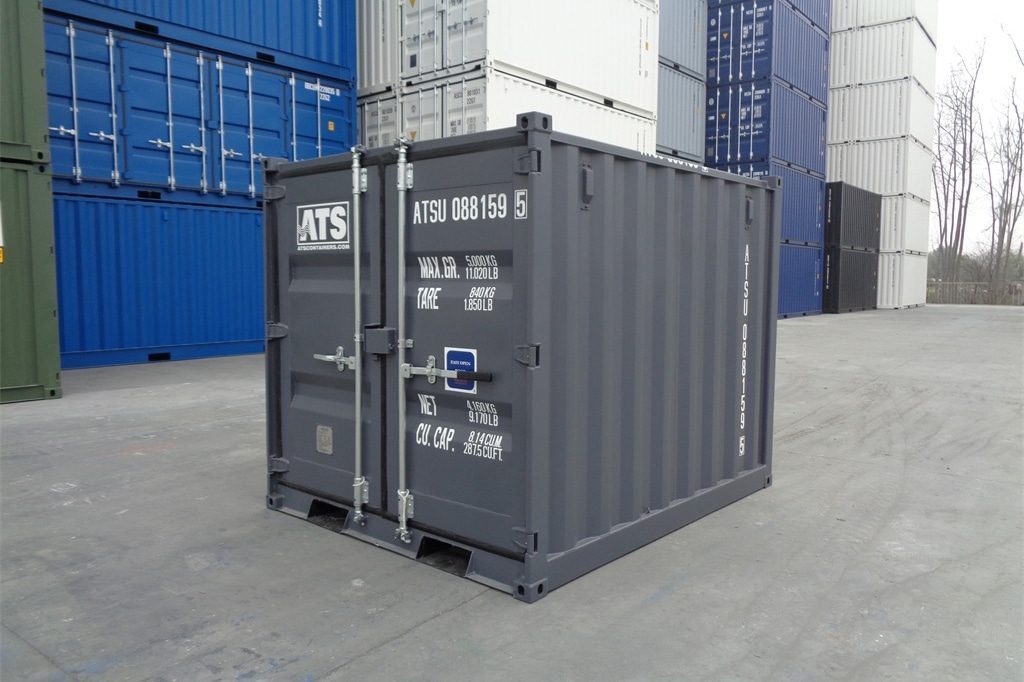The impact of a sea can for sale in emergency preparedness
Wiki Article
Whatever You Need to Understand About Shipping Containers and Their Practical Applications
Shipping containers have evolved from mere devices for transport to flexible structures with many functional applications. Their robust design and common sizing make them excellent for a range of uses beyond delivery. From innovative real estate services to sustainable farming, their versatility is noteworthy. The opportunities do not end there. Exploring their different features discloses surprising insights into contemporary difficulties and imaginative options. What other duties could these containers play in today's world?The Design and Structure of Shipping Containers

Inside, containers are developed to take full advantage of area, usually including wooden or steel floor covering that can sustain significant weight. Ventilation systems might be included to avoid wetness build-up, which is crucial for delicate cargo. Additionally, reinforced edges enable very easy handling by cranes and forklifts, assisting in seamless loading and discharging. This thoughtful layout and framework add to the containers' convenience throughout different delivery and storage applications.
Benefits of Making Use Of Shipping Containers
While many transport methods have their benefits, making use of delivery containers sticks out because of their unequaled convenience and efficiency. Shipping containers use a standard size, making them easy to pile and transport across different modes of transport, consisting of trucks, ships, and trains. This standardization reduces filling and discharging times, consequently raising total efficiency.Shipping containers are built from sturdy materials, providing durable protection for goods throughout transportation. They are safe and weather-resistant, lessening the threat of damage from ecological variables or theft. Additionally, the modular design of shipping containers permits for very easy customization, allowing businesses to adapt them for numerous functions, such as storage or mobile workplaces.
Their portability and cost-effectiveness make delivery containers an attractive alternative for businesses looking to simplify logistics and supply chain operations. These benefits contribute to the growing popularity of shipping containers in various markets.
Imaginative Real Estate Solutions With Shipping Containers
Cutting-edge real estate options have become an interesting application of delivery containers, leveraging their fundamental toughness for residential usage. These functional structures offer a sustainable choice to typical building products, frequently at a portion of the cost. Designers and engineers have transformed containers into elegant, useful homes, providing to varied way of lives and preferences.

Moreover, delivering containers are ecologically friendly, advertising recycling and reducing waste. Several tasks focus on power efficiency, integrating green roof coverings and solar panels. As urbanization increases, these cutting-edge housing services present a sensible reaction to real estate lacks while fostering an one-of-a-kind building aesthetic.
Shipping Containers in Retail and Pop-Up Shops
A growing variety of merchants are transforming to shipping containers as a dynamic remedy for pop-up stores and retail rooms. These functional frameworks offer an affordable alternative to traditional stores, permitting businesses to produce distinct, captivating atmospheres that draw in customers. Their modular style enables easy transport and installation, making them ideal for short-term or seasonal retail places.Stores can customize shipping containers to reflect their brand name identity, transforming them into visually appealing shops that stick out in crowded markets. The portable nature of containers likewise encourages efficient use space, enabling for imaginative formats that maximize client circulation and engagement. Shipping containers can be located in unusual places, such as uninhabited lots or urban parks, enhancing access and foot web traffic.

As the retail landscape progresses, shipping containers offer a cutting-edge and adaptable solution that fulfills the needs of modern customers while improving the purchasing experience.
Lasting Farming Practices Using Shipping Containers
Sustainable farming practices significantly include delivery containers as cutting-edge solutions for farming - shipping container storage. These container farms utilize hydroponics to optimize room and resource effectiveness, supplying a cost-effective approach to food production. By transforming shipping containers into farming hubs, farmers can deal with food safety and security and environmental concerns all at onceContainer Farming Conveniences
While standard agriculture faces difficulties such as land scarcity and climate change, container farming offers a sensible option that optimizes area and resources. This ingenious technique enables for year-round crop production in regulated atmospheres, minimizing dependence on weather. Container farms use less water than standard farming, promoting sustainability and conservation. They can be developed in city areas, bringing fresh produce closer to customers and decreasing transport discharges. In addition, the modular nature of delivery containers enables scalability, allowing farmers to adjust procedures based upon demand. Container farming likewise decreases chemical use by producing a confined ecosystem, inevitably enhancing food safety and security. As metropolitan populaces grow, container farming emerges as a useful solution to meet the raising need for regional, sustainable food resources.Hydroponics in Containers
Hydroponics, which permits plants to grow without soil by using nutrient-rich water, prospers within the confines of shipping containers, making it a perfect approach for metropolitan agriculture. These containers develop a regulated environment that enhances moisture, temperature level, and light, making it possible for year-round growing. With restricted space in urban areas, shipping containers use a scalable solution for growing fresh fruit and vegetables. Hydroponic systems within containers can include numerous methods, such as nutrient film strategy (NFT) and deep water culture (DWC), which make best use of return while reducing water use. This cutting-edge approach not just improves food safety and security yet also decreases the carbon footprint connected with typical farming methods. Hydroponics in containers stands for a forward-thinking remedy for sustainable metropolitan food manufacturing.Affordable Farming Solutions
As food production encounters boosting obstacles due to climate modification and urbanization, delivering containers become an affordable option index for agriculture. These flexible structures can be repurposed for numerous lasting farming techniques, such as hydroponics and vertical farming. By making use of controlled environments within containers, farmers can enhance development cycles and minimize resource usage, consisting of water and plant foods. Furthermore, shipping containers can be purposefully positioned in city areas, minimizing transportation expenses and improving accessibility to fresh produce. Their modular nature permits scalability, making it possible for farmers to increase operations as need expands. Repurposing containers adds to lose reduction, aligning with green farming initiatives. Overall, shipping containers present cutting-edge possibilities for effective and lasting food manufacturing.Emergency and Calamity Alleviation Applications of Shipping Containers

Organizations often make use of shipping containers to develop mobile clinics or area health centers, making certain that healthcare reaches those in need. In addition, they can be transformed right into command facilities for coordinating rescue procedures, thus boosting business performance during dilemmas.
Additionally, containers can be changed to keep crucial goods such as water, clothes, and food, safeguarding products till they are dispersed. Their wheelchair permits them to be conveniently transported to different locations, ensuring that assistance gets here where it is most urgently required. On the whole, delivery containers play a critical function in improving the performance of calamity relief campaigns worldwide.
Regularly Asked Inquiries
Exactly How Are Shipping Containers Transported From One Area to One More?
Shipping containers are moved by means of vehicles, ships, and trains, using cranes for discharging and loading. This multi-modal transportation system ensures reliable movement across land and sea, attaching global supply chains and assisting in global profession.What Is the Ordinary Life-span of a Shipping Container?
The ordinary lifespan of a delivery container typically ranges from 10 to 25 years, depending on maintenance, usage, and ecological factors. Appropriate treatment can prolong their usability, while disregard may bring about wear and tear and damages.Can Shipping Containers Be Modified for Different Usages?
Yes, shipping containers can be customized for numerous usages. They serve as homes, offices, pop-up stores, and Get More Information storage space devices. Their adaptability permits imaginative adaptations, making them ideal for a variety of applications.Are Shipping Containers Eco-friendly?
Shipping containers can be ecologically friendly, as they promote repurposing and recycling. Their toughness reduces waste, while their usage in different real estate and businesses minimizes the requirement for new materials, adding to lasting techniques.Just how Do I Pick the Right Size Shipping Container?
To choose the best dimension shipping container, one must analyze storage space requirements, consider the designated use, and review area schedule - visit our website Shipping Containers for Sale. Common sizes include 20-foot and 40-foot containers, each serving different storage and transportation needs efficiently
Innovative housing options have actually emerged as an interesting application of shipping containers, leveraging their inherent staminas for household usage. The flexibility of shipping containers enables for imaginative layouts, from single-unit residences to complex multi-container arrangements. Lasting farming techniques increasingly include shipping containers as innovative options for farming. Furthermore, the modular nature of delivery containers allows scalability, permitting farmers to adjust procedures based on demand. Hydroponics, which enables plants to grow without dirt by utilizing nutrient-rich water, flourishes within the confines of shipping containers, making it an ideal technique for urban farming.
Report this wiki page